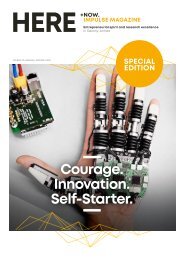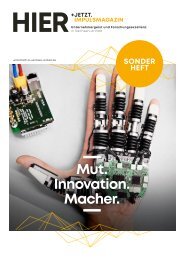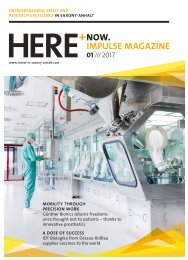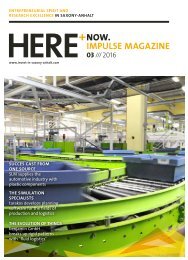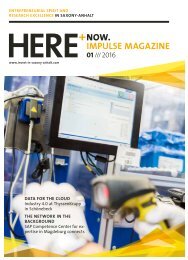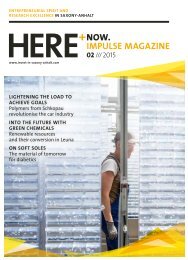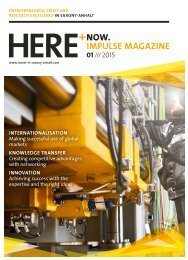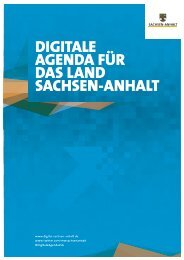HERE+NOW. Impulse Magazine // Future Technologies 2020
The German economy is undergoing a period of upheaval. The automotive industry is investing billions in developing new powertrain technologies and mobility services, while manufacturing industries and mechanical engineering are becoming greener and more sustainable. Following the phase-out of nuclear power, by 2038 brown coal will no longer be used for electricity generation and priority is being given to developing renewable energy sources. And importantly, digitalization is making its way into almost all areas of our lives. And as if all of this weren’t exciting enough, 2020 will go down in history as the year of the coronavirus pandemic. The virus is not only putting businesses and jobs at risk, it is also speeding up some development processes.
The German economy is undergoing a period of upheaval. The automotive industry is
investing billions in developing new powertrain technologies and mobility services, while
manufacturing industries and mechanical engineering are becoming greener and more
sustainable. Following the phase-out of nuclear power, by 2038 brown coal will no longer be used
for electricity generation and priority is being given to developing renewable energy sources.
And importantly, digitalization is making its way into almost all areas of our lives. And as if all of this weren’t exciting enough, 2020 will go down in history as the year of the coronavirus pandemic. The virus is not only putting businesses and jobs at risk, it is also speeding up some development processes.
You also want an ePaper? Increase the reach of your titles
YUMPU automatically turns print PDFs into web optimized ePapers that Google loves.
“In Saxony-Anhalt
we are investing
in the technologies
of the future.”
INTERVIEW
With the coronavirus pandemic, digitalization and the
transformation of the automotive industry, the economy is
undergoing a period of upheaval. In this interview, Professor
Dr Armin Willingmann, the Minister for Economy, Science
and Digitalisation, emphasizes that this presents major
opportunities for Saxony-Anhalt. By creating close links
between business and science and by making targeted
investments, Saxony-Anhalt intends to become the state for
future technologies.
Despite the coronavirus pandemic,
Saxony-Anhalt is seeing an astounding amount
of corporate investment. Why is that?
ARMIN WILLINGMANN: Well, it doesn’t come as a surprise!
Over recent years, Saxony-Anhalt has become a
highly attractive investment location. During this legislative
period, we have brought science and business
closer together and made targeted investments in both
areas. Now national and international companies are
coming here because they can find the highly qualified
and talented employees they need from our first-class
universities at a time when there is a serious shortage of
skilled staff. They can also run their development projects
in cooperation with our research institutes. In addition,
surveys have shown that the residents of Saxony-Anhalt
see industry in a positive light and are very open to large
new industrial developments.
But the economy is undergoing a period of
upheaval, particularly with regard to the
automotive industry, digitalization and the
energy transition.
ARMIN WILLINGMANN: We are undoubtedly facing
significant challenges, but all of this also brings major
opportunities for Saxony-Anhalt. For example, we have
built world-class expertise in the field of automotive engineering.
Leveraging on this, we would like to become the
leading federal state for state-of-the-art technologies,
and we are already making good progress in this direction.
The Chinese-American company Farasis is building
a factory for electric car batteries in Bitterfeld-Wolfen at
a cost of around 600 million euros. Not far away, the FEV
Group has just opened the world’s largest independent
development and test center for high-voltage battery
systems. Porsche and Schuler AG are constructing an
ultra-modern bodywork plant in Halle, and the Japanese
HORIBA Group is building its European test center for fuel
cells in Magdeburg. Centers of Excellence are springing up
all over Saxony-Anhalt which are attractive to investors
but also to employees. This is where added value and
high-quality jobs will be created in the years to come.
Is it possible to put a figure on
the success of this process?
ARMIN WILLINGMANN: We can get an idea of the level
of growth by looking at corporate investment. In the
previous legislative period the volume of investment was
around 3.1 billion euros. In the current period, which lasts
until mid-2021, we will probably see investments of more
than 4 billion euros.
Why are you so optimistic that the next wave of
company moves to the region will be successful?
ARMIN WILLINGMANN: There are several good reasons
for our optimism. Saxony-Anhalt is already an attractive
investment location which can offer world-class
expertise in a number of areas and many investors have
already recognized that. In addition, the German federal
government is making more than 4.8 billion euros
available to Saxony-Anhalt alone to help with managing
structural change. This puts the state of Saxony-Anhalt
in the position to make targeted investments itself,
including in digital infrastructures.
What are the other areas where Saxony-Anhalt
has a lot to offer?
ARMIN WILLINGMANN: Armin Willingmann: Saxony-
Anhalt has traditionally been a popular location for the
chemical industry. We want to make use of the available
expertise to develop a model region for hydrogen over
the next few years with strong partners from the world
of business, such as Linde and Total, and the Fraunhofer
research institutes. While other people are just talking
about the potential of hydrogen, we are already funding
our first research projects, for example to determine how
green hydrogen can be produced and used cost-effectively
on an industrial scale and to identify how it can safely
be stored. In addition, the Finnish company UPM gave the
go-ahead in October for the construction of the world’s
first biorefinery of its kind in Leuna at a cost of 550 million
euros. From 2022 onward, the plant will be producing biochemicals
from sustainably harvested hardwood that can
be used to manufacture more sustainable textiles, plastics,
rubber, cosmetics and medicines. But Saxony-Anhalt is also
an excellent location for industries such as medical technology,
pharmaceuticals and biotechnology. This is why I
am optimistic that we will succeed in turning Saxony-
Anhalt into the state for future technologies.
In conversation: Saxony-Anhalt’s Minister for
Economy, Professor Dr Armin Willingmann.
6
7








